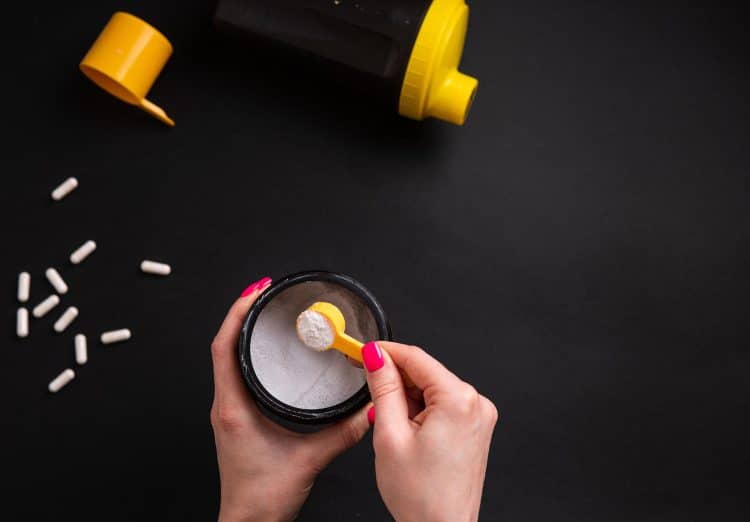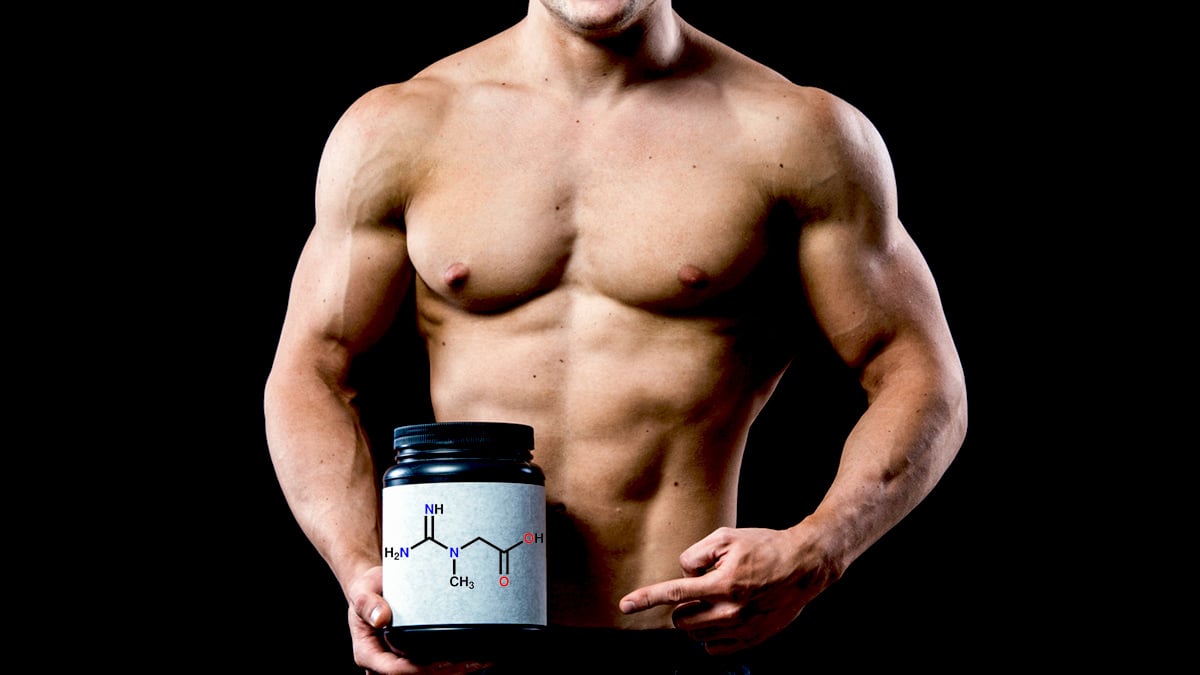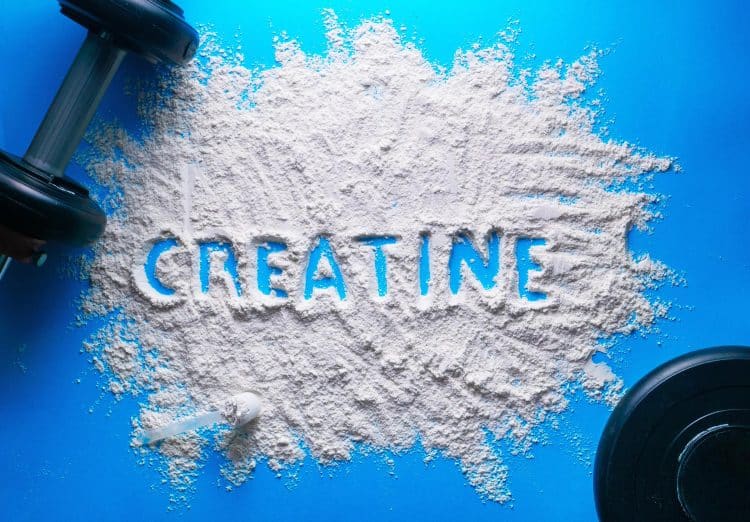creatine is a popular sports nutrition supplement and a hit with bodybuilders. It is considered an ergogenic supplement that improves performance. Creatine can be produced naturally in the liver and can be obtained from the diet.
Creatine can help with energy production during short, high-intensity exercises like weightlifting or sprinting.
Studies reveal that creatine can improve muscle mass, strength, and exercise performance. However, in addition to its many benefits, the supplement is criticized by many for its alleged side effects. Notably, there is no empirical evidence to support these claims. [1]
Before exploring if and how creatine is associated with body weight, let’s discuss the nature, composition, and effects of creatine.
understand creatine
Creatine is an organic compound found naturally in muscle cells. It is made up of amino acids arginine and glycine. Creatine is also found in natural food sources such as meat, fish, and other poultry. Also, creatine supplements have gained popularity among bodybuilders and athletes who play physically intense sports.
Creatine supplements are similar to amino acids in that they are made up of essential compounds that help build protein in your body. While 95 percent of the body’s creatine is stored in the muscles, five percent is found in the brain.
Creatine in skeletal muscles is stored as creatine phosphate. This substance binds to ADP (adenosine diphosphate) to become adenosine triphosphate (ATP), which serves as an energy fuel for the body and brain. [2]
Creatine composition
Creatine comprises three basic amino acids: arginine, glycine and methionine. If you are concerned about your calorie intake due to creatine intake, you should know that most creatine supplements on the market offer zero calories Per portion.
How does creatine work in your body?
Creatine helps maintain a continuous supply of energy to muscles during exercise. It is also essential for the brain, heart, and the functioning of other tissues. In particular, it is possible to have a low creatine store in your muscles even though it occurs naturally in your body.
In case of creatine deficiencies or for bodybuilding purposes, it can be consumed as a supplement. Therefore, if you plan to take a creatine supplement, it is important to understand that the compound will bind to a phosphate molecule to form phosphocreatine. Phosphocreatine provides your body with instant energy, fueling high-intensity performances. With proper creatine supplementation, you can expect an increase in ATP availability, providing your body with additional strength, energy, and endurance.
Notably, creatine does not show instant results. It takes time for creatine to saturate your muscles. Creatine saturation occurs when your body has enough creatine stores and the inactive chemical begins to work its magic.
Can creatine make you fat?
There is a lot of discussion about whether creatine can increase your body fat stores. Creatine has no calories of its own and will not make you fat unless you have a calorie surplus. In a calorie surplus, you consume more calories than you expend in a day.
An athlete trying to build muscle mass and strength needs more calories. When the body is put through rigorous training, it will burn excess calories for fuel instead of storing them as fat.
Some studies indicate that creatine retains water within the muscles, causing them to swell. Lean, muscular people retain water in their muscles during the initial phase of creatine intake. Therefore, the weight gain associated with creatine supplementation may be due to water retention. [3]
If your body has body fat levels ranging from normal to higher levels, the water retention from creatine intake may not show up in your muscles. This is because the muscles are already covered by fat instead of water. So if you want to build bigger, stronger, fuller muscles, creatine is worth a try!
Can creatine make you gain weight?
Creatine can help you gain muscle mass. However, you must work hard in the gym. It’s certainly not as simple as gulping down creatine and waiting for your muscles to fire up.
For creatine to work, you’ll have to work really hard. Creatine converts to ATP in the body, essential for energy generation. The ATP is then rapidly catalyzed in the muscles, helping them recover after intense bouts of training.
The increased energy can help improve your performance in the gym, which can lead to gains in muscle mass.
For some, creatine intake may initially accompany bloating, especially during the loading phase. However, the swelling balances out as your body reaches creatine saturation.
[Related: Weight Gain Calculator]
Creatine Load and How It Affects Your Body Weight
In the creatine loading phaseAthletes consume 20 to 25 grams of protein every day to achieve muscle saturation quickly. This phase is followed by the maintenance phase, which involves consuming three to five grams of creatine every day.
The loading phase can cause water weight gain, but fluid retention may disappear as lean muscle mass increases.
creatine dose


Whether you are looking for conscious weight gain or not, creatine intake should be limited to the recommended dose. People following an omnivorous diet, which contains 1 to 2 grams of creatine derived from meat and fish, can reach creatine saturation by consuming five grams of creatine four times a day for at least five to seven days.
You may be able to maintain your creatine store by ingesting three to five grams of creatine per day. However, athletes and weightlifters who want to gain strength and muscle should consume 5 to 10 grams of the compound daily. Take a look at our creatine dosage calculator to find out your daily creatine needs.
Studies reveal that creatine can help build lean muscle mass. Therefore, creatine can help you gain weight without accumulating body fat. Also, it can promote faster recovery from injuries. [4]. Creatine is a proven supplement for muscle growth and works for most body types. Furthermore, men and women you can also use a creatine supplement.
Safety
Creatine is considered safe, but that does not mean that all supplements available on the market have the same standards. [5]
Taking creatine for a long period of time could have side effects, although not very significant ones. Some of the more well-known side effects of creatine overdose include weight gain, shortness of breath, anxiety, fatigue, headache, fever, nausea, vomiting, and upset stomach, among other conditions. You should consider lowering your dose if you experience any of these problems.
Creatine is not recommended for people with health problems such as diabetes, kidney or liver disease. Also, it is not recommended that people under the age of 18 and pregnant or lactating women take creatine supplements. Finally, if you are taking medication, it is best to consult a healthcare professional before supplementing with creatine.
Things to do if you gain weight while supplementing with creatine
Although the weight gain from taking creatine might be temporary, here’s what you can do for quick relief:
- Regulate your sodium intake: Excessive accumulation of sodium in the body can cause fluid retention. Eating more fresh fruits and vegetables and reducing your intake of fast and processed foods can help keep your sodium intake low and decrease your chances of gaining water weight. [6]
- Limit your carbohydrate intake: Sure, carbs are great for energy, but a high-carb diet can cause you to gain weight. Reducing your carbohydrate intake can be helpful, especially when fighting weight gain.
- Get the best quality creatine: Also, follow a daily dose to avoid side effects.
- Train hard: Intense training sessions can reduce water retention. The more you train, the less water your body will accumulate and the more fluid your body will eliminate in the form of sweat.
frequent questions
Is it safe to consume creatine?
Creatine consumption has no adverse health effects when taken at the recommended dosage. It is best to consult a medical professional if you have any underlying medical conditions before beginning creatine supplementation.
How can I start with creatine?
Although not always necessary, the loading phase is one of the most effective ways to start creatine supplementation. Sticking to a dose of three to five grams for beginners and five to ten grams for high level athletes can work well.
What is the most popular form of creatine used by athletes?
Creatine monohydrate is a supplement widely used by high-performance athletes.
Can I lose the weight I gained with creatine supplementation?
Creatine will not make you lose or gain weight. If you are concerned about weight gain from water retention, yes, you can lose that weight when you stop taking the creatine supplement.
Can women take creatine?
Yes, women can take creatine, especially if they plan to improve their exercise capacity, build lean muscle mass, build muscle, and improve recovery speed.
More information on creatine:
Bottom line
In short, there is no evidence that creatine is directly related to weight gain and obesity. On the other hand, this supplement is not a shortcut to building muscle.
Lastly, people with health conditions such as liver problems should consult a doctor before starting creatine supplementation.
References:
- Guingand, Deborah L. de, et al. “Risk of adverse outcomes in women taking oral creatine monohydrate: a systematic review and meta-analysis – PMC”. PubMed Center (PMC)June 15, 2020.
- Creatine: MedlinePlus Supplements”. Creatine: MedlinePlus Supplements, accessed September 9, 2022.
- Creatine supplementation increases total body water without altering fluid distribution: PubMed. PubMedMarch 1, 2003.
- Cooper, Robert, et al. “Creatine supplementation with specific views of exercise/athletic performance: an update – PMC”. PubMed Central (PMC), July 20, 2012,
- Wax, Benjamin, et al. “Creatine for exercise and sports performance, with recovery considerations for healthy populations – PMC”. PubMed Center (PMC)June 2, 2021,.
- “Creatine Monohydrate Fat Notice”: https://www.fda.gov/media/143525/download
- Rakova, Natalia, et al. “Increased salt intake induces body water conservation and decreases fluid intake – PMC”. PubMed Center (PMC)April 17, 2017.



